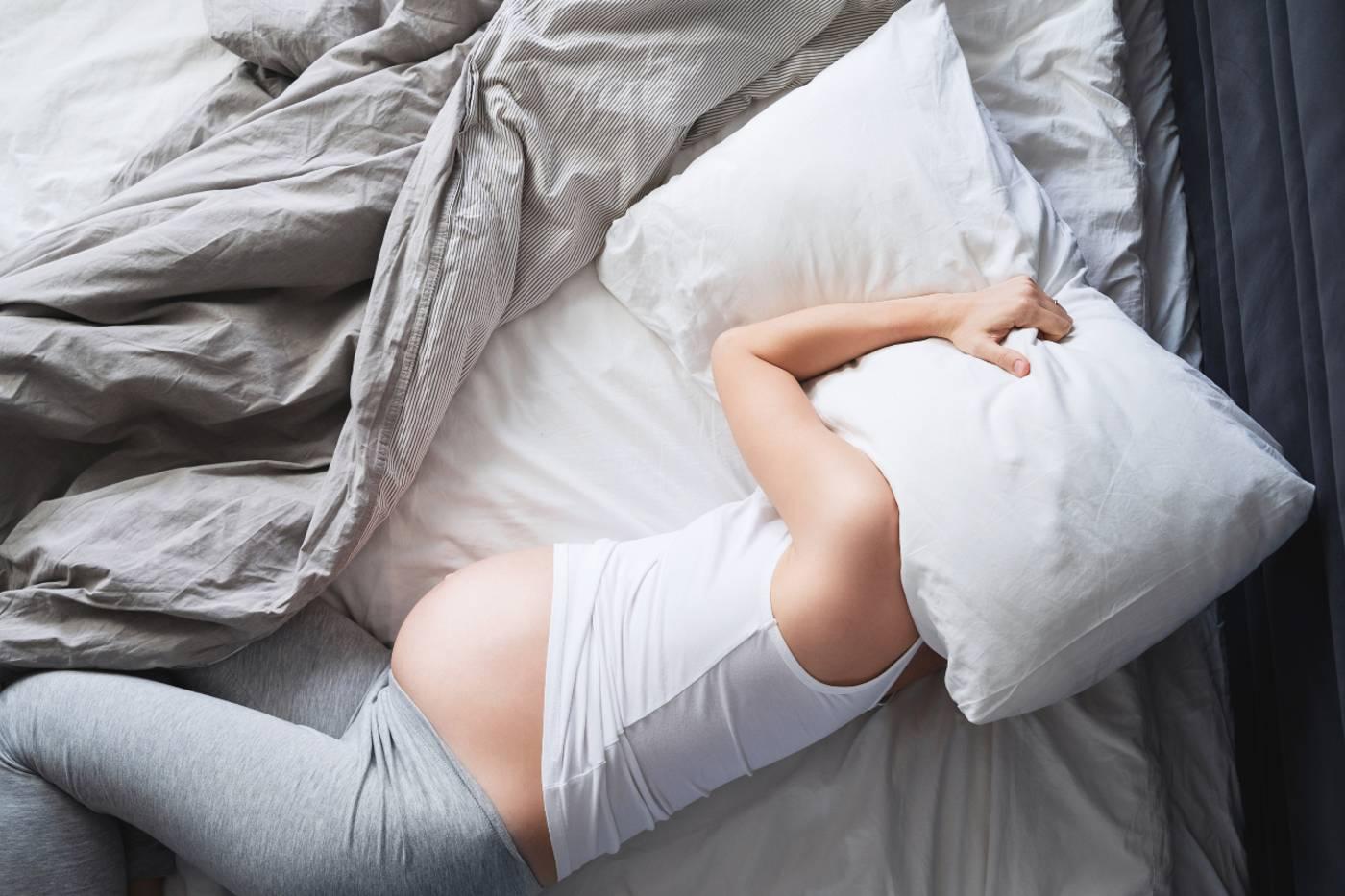PREGNANCY
Pregnancy Insomnia: Why You Struggle to Sleep When Expecting
Learn what’s behind your pregnancy sleep troubles—and what you can do about it.

Written by
Holly Pevzner

While you probably expect your sleep habits to change once you become a parent, you may not be prepared for the sleep problems that often occur before your baby is even born. But pregnancy sleep problems are a pretty significant issue, impacting up to 97% of pregnancies, with around 60% of pregnant folks struggling with insomnia.
According to a report in the journal BMC Pregnancy and Childbirth, pregnancy insomnia has been shown to chip away at quality of life, mental and physical health, and the baby-to-be’s health. But that doesn’t mean you’re destined to spend 9 months in the depths of sleep deprivation. There are things you can do to help sidestep pregnancy insomnia—and research-backed strategies to manage and treat insomnia during pregnancy, too. Learn how you can start sleeping better during pregnancy.
What is pregnancy insomnia?
Insomnia is a common sleep disorder where you have a hard time falling asleep and staying asleep—or if you’re particularly unlucky—both! Folks with insomnia often get too few ZZZs at night and/or their sleep quality is poor, leaving them feeling less-than-refreshed when they wake up. Pregnancy insomnia encompasses all the above…while you’re also expecting a baby. Experts note that pregnancy is one of the most common causes of insomnia—and many people experience insomnia for the first time during their pregnancy.
When does insomnia start in pregnancy?
A quarter of pregnant people experience insomnia in their first trimester—or through week 12. That number continues to grow right along with Baby, with up to 80% of pregnancy insomnia sufferers reporting symptoms during the third trimester, which comprises pregnancy weeks 28 to 40.
What are the symptoms of pregnancy insomnia?
Whether you experience insomnia early pregnancy or late, the symptoms remain the same, and include:
-
Struggling to fall asleep - Waking throughout the night
- Waking too early
- Light sleep
And those pregnancy insomnia symptoms then result in…
-
Irritability - Slowed reflexes
- Brain fog
- Difficulty focusing
- Memory trouble
What causes insomnia during pregnancy?
There are several reasons why you may experience pregnancy insomnia, including a surge in pregnancy hormones like estrogen and progesterone. For example, while the influx of progesterone makes you sleepy during the day, the hormone also causes you to wake in the night.
Here’s how hormones can disrupt your sleep in pregnancy—plus, other common causes of pregnancy insomnia:
-
Back pain and round ligament pain: As your baby-to-be grows, they place more pressure on your joints and your back, which can cause sleep-sapping discomfort throughout the night. (Learn more about pregnancy back pain and round ligament pain.) - Increased need to pee: The uptick of progesterone and the increased pressure on your bladder during pregnancy means you’re more apt to wake to use the bathroom at night…and then you must start the getting-to-sleep process all over again!
- Nausea: A 2021 report found that experiencing severe nausea and vomiting in pregnancy results in an increase of sleep disturbances. (Learn more about morning sickness.)
- Pregnancy anxiety: The stress of pregnancy itself, plus the giant life change in front of you, can cause amp up the production of the hormone cortisol, which makes it more difficult to fall asleep.
- Restless legs syndrome: Up to 34% of pregnant folks have sleep-disturbing restless legs syndrome, which is marked by the urgent need to move your legs, especially when you’re resting.
- Increased heart rate: During pregnancy, there’s more blood coursing through your veins, which can elicit heart palpitations that make it more difficult to fall asleep.
- Shortness of breath: A surge of progesterone coupled with a growing uterus putting pressure on your diaphragm can cause sleep-disrupting shortness of breath.
- Heartburn: The one-two punch of your uterus pressing against your stomach and hormonal changes can bring about heartburn, which often worsens when you lay down to sleep, as gravity can’t work to keep stomach acid down.
Who’s at risk for pregnancy insomnia?
While anyone carrying a baby is potentially at risk for developing insomnia during pregnancy, there are certain conditions that can increase your chances of pregnancy insomnia, including:
-
Hypertension - Preeclampsia
- Gestational diabetes
- Depression
- Preexisting insomnia
- Preexisting restless legs syndrome
- Preexisting obstructive sleep apnea
- Obesity
What are the risks of insomnia during pregnancy?
While feeling exhausted and grouchy during the day are obvious—and unpleasant—side effects of pregnancy insomnia, those are not the only ramifications. In fact, sleep problems in pregnancy, like insomnia, are correlated with…
-
Inflammation - Gestational diabetes
- Preeclampsia
- Pregnancy depression and anxiety
- Postpartum depression and anxiety
- Mood disorder/psychiatric illness relapse
- Intrauterine growth restriction
- Premature birth
- Longer labor
- C-section delivery
What helps insomnia during pregnancy?
There are many factors associated with pregnancy insomnia that you can’t change (we’re looking at you, hormones!), but that doesn’t mean there’s nothing you can do to sleep better. There are several strategies—from shifting sleeping positions to prescribed medications—that can help. But whatever you do, don’t ignore your pregnancy sleep troubles. The research is clear: Early intervention to treat the sleep disturbance, like pregnancy insomnia, are super important to avoid adverse pregnancy outcomes. Plus, if your sleep disturbances are left untreated, you run the risk of them continuing during the postpartum period—or even becoming chronic. Here are some ways to help treat your pregnancy insomnia:
-
Use the morning light. Studies show that exposure to light during the day (especially in the morning) increases evening sleepiness, helps you fall asleep more quickly, improves sleep quality, and increases restorative slow-wave sleep. Essentially, early light sets your circadian clock to keep you alert during the day and sleepy at night. - Tamp down heartburn. If heartburn or evening morning sickness is stealing your sleep, start eating several smaller meals throughout the day, instead of three larger ones. Avoid heartburn- and nausea-triggering eats, like spicy or greasy foods. And prop your head and shoulders up for sleep to help stop your stomach acid from coming up. (Find out more ways to treat pregnancy heartburn.)
- Position yourself properly. If heartburn isn’t your issue, try sleeping on your left side with one pillow between your legs and another supporting your bump. This helps promote blood flow and keep your body aligned, reducing discomfort.
- Stop caffeine early. Experts recommend avoiding caffeine eight full hours before bedtime. So, if you are shooting for lights-out at 9pm, cap your coffee, tea, or cola drinking no later than 1pm.
- Drink water this way. Swig 64 to 96 ounces of water throughout the day, but mostly in the morning and afternoon. Then, in the two hours leading up to bedtime, stop. This’ll help quell nighttime bathroom visits, while still helping to avoid sleep-stealing evening leg cramps that are often caused by dehydration.
- Relieve leg discomfort. Beyond drinking water, you can reduce your chances of nighttime leg cramps by regularly stretching your calves. Try putting your hands on a wall, placing your right foot behind your left, and slowly bending your left leg forward, keeping your right knee straight with your right heel on the floor. Hold the stretch for 30 seconds, ensuring your back is straight and your hips are facing forward. Switch legs and repeat.
- Adjust the temperature. Hormonal changes plus an uptick in blood flow raise your body temperature during pregnancy, which can make sleepytime a hot and sweaty affair. To help, keep your bedroom between 60 and 68 degrees Fahrenheit (the ideal temp range for ZZZs) and opt for 100% cotton, linen, or bamboo sheets, which are both breathable and cooling.
- Play white noise. During pregnancy, you’ll experience less deep (or slow wave) sleep, which means you’re more susceptible to wakeups. To counter this, turn on a white noise machine, like SNOObie, designed to mask sleep-disrupting sounds, like the traffic or a loud TV. (Discover how the whole family benefits from white noise.)
- Make the most of the dark. When the lights go down, the pineal gland in your brain begins to release the hormone melatonin, which is needed for sleep. To ensure the hormone flows when it should, dim your lights between 1 and 4 hours before bedtime and shut off all screens about an hour or two before going to sleep. At the same time, consider wearing a sleep mask and/or putting up blackout curtains.
- Try relaxation techniques. A soothing bath, a relaxing massage, stretching, meditation, or breathing exercises—whatever gets you to a state of calm, give it a go. To help with meditative breathing, turn to SNOObie, which features Magic Breathing tracks that synchronize light and sounds to guide you through your relaxation exercise. Start with the Fast Magic Breathing track and work up to the deeper, slower breathing in the Slow Magic Breathing track. Do this before bed—and if you wake and can’t fall back asleep.
- Consider cognitive behavioral therapy: Studies show that cognitive behavioral therapy for insomnia (CBT-I) can help ease insomnia and improve sleep for pregnant people. CBT-I may also improve feelings of fatigue, anxiety, and depression. With CBT-I, you work with a therapist who’s trained to help you change any unproductive thoughts and behaviors that negatively affect your sleep.
Medications and Supplements to Treat Insomnia in Pregnancy
Using medication or supplements for insomnia during pregnancy is tricky, and often not advised. That’s because many insomnia treatments have not been tested for safety on pregnant individuals. Still, there are some supplements and medications that may be able to help ease insomnia in pregnancy. Of course, check with your healthcare provider before taking anything.
-
Folate: If restless legs syndrome is keeping you up at night, you may need to increase your folate intake. - Calcium: Low calcium levels can contribute to sleep-disrupting leg cramps. So, if you’re unable to get 1,000 milligrams of calcium a day via your diet, supplementation may help.
- Zopiclone and trazodone: A 2020 report noted that the use of either of these sleep medications (aka Imovane and Desyrel) “may be justified.”
Does melatonin help with pregnancy insomnia?
It is generally recommended that pregnant people not use melatonin supplements to help treat their insomnia—or any sleep disturbance in pregnancy. That’s because melatonin crosses the placenta, working to help establish your baby-to-be’s sleep-wake cycle. So, taking melatonin supplements for insomnia during pregnancy may deliver too much melatonin to your little one, potentially mucking-up their sleep-wake cycle development. It’s also important to remember that the Food and Drug Association does not regulate melatonin supplements, so there’s always the risk that your supplement may not contain what you think it does.
Can insomnia during pregnancy be prevented?
While pregnancy insomnia is not entirely preventable, sticking to a regular sleep schedule can help keep your sleep on track. At the same time, adhering to many lifestyle tweaks suggested for treating pregnancy insomnia can also keep you from developing pregnancy insomnia in the first place.
How long does pregnancy insomnia last?
There are no hard and fast rules when you’ll be able to say good night to pregnancy insomnia. While many of the sleep-sapping body changes you experienced while expecting begin to revert shortly after giving birth, that doesn't mean your sleep patterns suddenly go back to their pre-pregnancy state. After all, you will be caring for a newborn! To help, treat your insomnia early.
And, once the baby arrives, make sleep a priority for you both. That means…
-
Lean into the proven Baby-calming technique called the 5 S’s, which is designed to activate your newborn’s calming reflex, which is like nature’s “on switch” for sleep. - Consider SNOO Smart Sleeper, which not only keeps sleeping babies safely on their backs (eliminating that sleep-sapping worry), but also adds 1 to 2 hours of sleep each night.
- Accept all the help you are offered—and simply ask if the offers aren’t coming! Remember, it not only takes a village to raise a child, it can take a village to help you all sleep, too!
More Sleep Need-to-Knows:
- Pregnancy Guide to Better Sleep
- Dr. Harvey Karp’s Best Newborn Sleep Tips and Tricks
- Learn How White Noise Helps Babies Sleep
- Why Sleep is the Ultimate Brain Boost
***
REFERENCES
- Considerations in Treating Insomnia During Pregnancy: A Literature Review. Psychosomatics.July–August 2018
- Sleep Foundation: Pregnancy Insomnia
- A systematic review and meta-analysis of prevalence of insomnia in the third trimester of pregnancy. BMC Pregnancy and Childbirth. April 2021
- MedilnePlus: Insomnia
- Cleveland Clinic: Pregnancy Insomnia
- Up To Date: Prenatal care: Patient education, health promotion, and safety of commonly used drugs
- Sleeping for Two: The Great Paradox of Sleep in Pregnancy. Journal of Clinical Sleep Medicine. June 2015
- Sleep quality in women with nausea and vomiting of pregnancy: a cross-sectional study. BMC Pregnancy and Childbirth. February 2021
- Restless legs syndrome and pregnancy: prevalence, possible pathophysiological mechanisms and treatment. Acta Neurologica Scandinavica. August 2017
- The Nemours Foundation, KidsHealth: Why Do Some Women Feel Short of Breath During Pregnancy?
- Factors associated with insomnia in pregnancy: A prospective Cohort Study. European Journal of Obstetrics & Gynecology and Reproductive Biology. February 2018
- Sleep quality and BMI in pregnancy– a prospective cohort study. BMC Pregnancy Childbirth. January 2022
- Insomnia during pregnancy: Diagnosis and Rational Interventions. Pakistan Journal of Medical Sciences. July-August 2016.
- Sleep disturbances in pregnancy: Why and how should we manage them? Acta Obstetricia et Gynecologica Scandinavica. March 2022
- Effects of light on human circadian rhythms, sleep and mood. Somnologie. August 2019
- Sleep Foundation: Pregnancy Sleep Positions
- American College of Obstetricians and Gynecologists: How much water should I drink during pregnancy?
- Mayo Clinic: What causes leg cramps during pregnancy, and can they be prevented?
- Sleep Foundation: Light and Sleep
- Home Lighting Before Usual Bedtime Impacts Circadian Timing: A Field Study. Photochemistry and Photobiology. May 2015
- Cleveland Clinic: Why You Should Ditch Your Phone Before Bed
- Sleep Pharmacotherapy for Common Sleep Disorders in Pregnancy and Lactation. Chest. January 2020
- Sleep Foundation: Sleep Aids to Take While Pregnant
Disclaimer: The information on our site is NOT medical advice for any specific person or condition. It is only meant as general information. If you have any medical questions and concerns about your child or yourself, please contact your health provider.
SHARE THIS ARTICLE
MOST LOVED
Sleepytime Sidekicks
More on Pregnancy
About Holly Pevzner
Holly Pevzner is Happiest Baby’s Staff Writer. She specializes in creating parenting, pregnancy, health, nutrition, and family travel content. Her work—including essays, columns, reported features, and more—has appeared in outlets such as EatingWell, Family Circle, Parents, Real Simple, and The Bump. Before becoming a full-time writer, Holly held senior staff positions at Prevention, Fitness, and Self magazines, covering medical health and psychology. She was also a contributing editor at Scholastic Parent & Child magazine and a regular kids-health columnist for Prevention and First For Women magazines. Holly lives in Los Angeles with her husband, two boys, and terrier mix.












